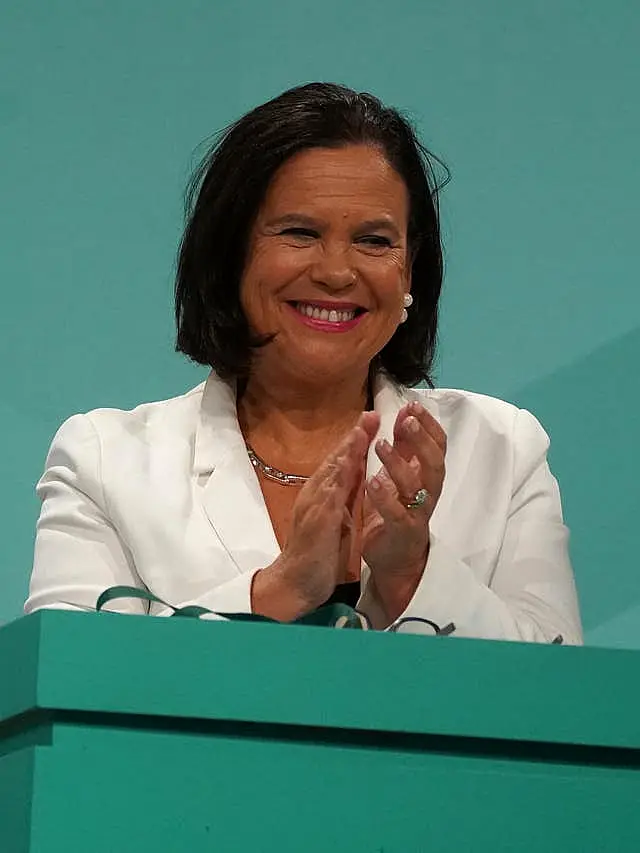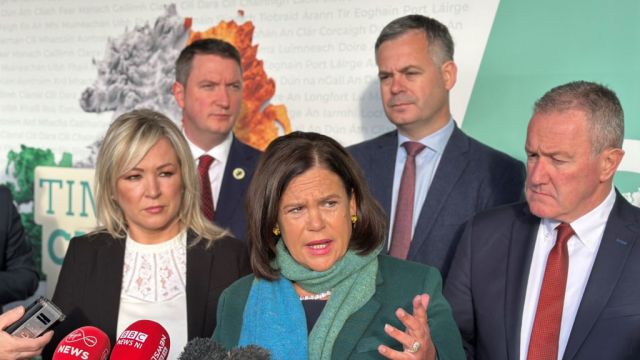Mary Lou McDonald has said Sinn Féin politicians have the right to pursue complaints against the press “in a way that they deem appropriate”, as her party faced criticism over legal action taken against members of the media.
It comes after Press Ombudsman Susan McKay said politicians should question whether suing journalists rather than making a complaint through the ombudsman’s office is in the public interest.
The Sinn Féin leader was speaking to reporters at the second day of her party’s Ard Fheis, which is being held at the Technological University of the Shannon’s campus in Athlone, Co Westmeath.
Ms McDonald told reporters: “All of you do a very, very important job in a functioning democracy, and you will write your copy, broadcast your material and there’ll be the necessary attention and to-ing and fro-ing in all of that.

“There’s never an intention to make this about any individual. This is simply a situation where you have your job to do, we have ours to do, as and when a line is crossed, as when something is said or published that crosses a particular line, people have the right to use the mechanisms available to them to vindicate their name.”
She said this was not an issue unique to Sinn Féin.
It was put to her that Sinn Féin politicians had not used Press Council mechanisms in recent years, to which she replied: “People will be aware when they have a complaint or an issue of all of the options available to them. People generally take advice on it.”
She also denied that she had mounted a strategic lawsuit against public participation (Slapp) against members of the media.
Slapp actions are often characterised as lawsuits, sometimes disguised as defamation actions, initiated with the intention of silencing or draining the resources of a journalist or publication.
Asked by reporters about the allegations around mounting a Slapp, Ms McDonald said: “I have done no such thing and I reject that out of hand.”
She also told reporters she does not believe her party is above media scrutiny.
Ms McDonald said it was her view that the best outcome is when matters are “resolved directly” between individuals and publications.
She added that politicians from other political parties have taken legal action against the press.
Critique, analysis, criticism is all part of the cut and thrust of this democratic process, and we support and welcome that.
Advertisement
Ms McDonald said: “We do not consider ourselves above any scrutiny. Critique, analysis, criticism is all part of the cut and thrust of this democratic process, and we support and welcome that.”
She added: “Every individual has the right and the freedom to pursue matters in the way that they deem appropriate.”
Separately, Ms McDonald reiterated a call for the Israeli ambassador to Ireland to be expelled over the conflict in Gaza.
Sinn Féin is bringing a motion to the Irish parliament seeking a referral of Israel to the International Criminal Court by Ireland.
While calling for a ceasefire in Gaza, she said: “Clearly, when the ambassador’s government, despite the calling from parliaments – but more important from the United Nations – refuses to countenance a ceasefire and peace, and when that government relentlessly bombards a civilian population which has resulted in thousands of deaths, many thousands of children’s lives taken, attacks on UN properties and personnel, on journalists.
“In those circumstances, you’re absolutely bound to examine every lever that you have at your disposal to put pressure on that policy and put pressure on that government.
“It’s not simply to expel an ambassador for the sake of it, this is all about ceasefire”.
The Palestinian ambassador is due to address the Sinn Féin Ard Fheis on Saturday.
The party has also used the annual conference to call for a return to powersharing in Northern Ireland.
The Stormont Assembly remains collapsed amid protest action from the DUP over post-Brexit trading arrangements.
Sinn Féin vice-president Michelle O’Neill has said “public patience is wearing thin” with the DUP, and accused the UK government of “pandering to” Sir Jeffrey Donaldson's party.
“There’s no doubt everybody thinks that the DUP need to end the boycott and get back into the assembly and take on the issues of the day.
“But equally, I think the British government needs to call time on this two-way negotiation with the DUP because they’re letting us drift endlessly 18 months now past the election.
“I don’t think that’s a tenable position.”







